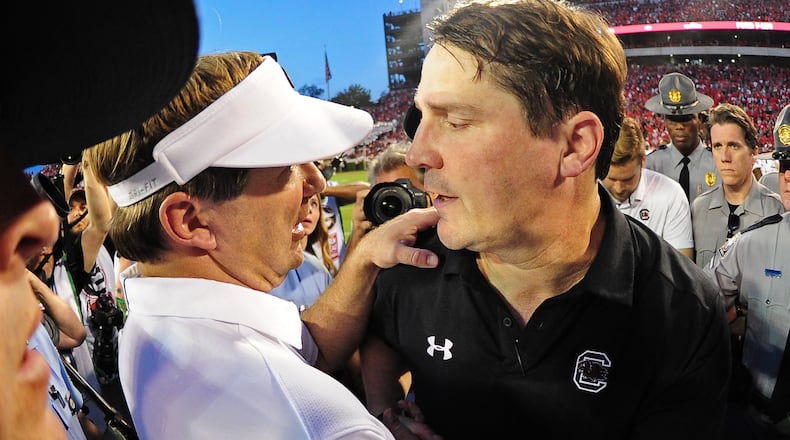Will Muschamp has had a fascinating career. He was head-coach-in-waiting behind Mack Brown at Texas. He was the head coach who followed Urban Meyer at Florida. He was the head coach who followed Steve Spurrier at South Carolina.
And here’s the one thing we know for sure about Will Muschamp: He’s not a head coach.
He was fired Sunday seven games into his fifth South Carolina season. His Gamecocks were 2-5; they were 4-8 last year. His record was 28-30. They were 17-22 in SEC play. Of his four completed seasons, two saw South Carolina finish above .500, and one of those yielding a 7-6 record.
His Carolina worksheet isn’t a Xerox of his Florida tenure, but it’s close. There also was a 7-6 season in Gainesville. There was a 4-8, too. He won 17 SEC games (losing 15); he won 28 games overall (against 30 wins). At neither outpost did he take his team to the conference championship game. The one time he came close was a fluke: The 2012 Gators went 11-2 while ranking 103rd of 120 FBS teams in total offense.
Confession: The career path of William Lawrence Muschamp has become a strange fascination of this quirky correspondent. If we were to play “Six Degrees of Will Muschamp,” there’d be no football stone left unturned.
He was born in Rome, Ga. He played safety for the Bulldogs under Ray Goff, who played quarterback for Vince Dooley. He worked under Nick Saban at LSU and with the Miami Dolphins. He worked under the newly minted U.S. Senator Tommy Tuberville at Auburn. He would later return to Auburn to work alongside Gus Malzahn. His brother, Mike, is a successful head coach at Lovett. His son, Jackson, is a freshman quarterback at Georgia.
Muschamp himself was a teammate of Bulldogs coach Kirby Smart and, while the two were assistants at Valdosta State under Chris Hatcher (who played quarterback for Hal Mumme), Muschamp and Smart were roommates.
That’s a heck of a resume. It will, however, take a brave (read: idiotic) athletic director to entrust Muschamp with a head coaching job again. South Carolina should have known better: If you can’t win big at Florida, which has every advantage known to man, how can you win in Columbia, S.C.? That said, we should probably cut Carolina a break. Muschamp wasn’t its first choice. Smart was.
You’ll recall that Spurrier — who in July 2015 called an impromptu press conference to rebut an Atlanta scribe’s suggestion that he’d quit South Carolina the moment he realized he could no longer win — announced Oct. 15, 2015, that he was retiring immediately. (South Carolina’s record: 2-4. Told you.) That gave the Gamecocks a head start on finding a replacement. It’s widely believed that AD Ray Tanner zeroed in on the career assistant topping most wish lists.
Sixteen days after Spurrier pulled the plug, Mark Richt started Faton Bauta against Florida. Georgia lost 27-3. AD Greg McGarity had been wrestling with the Richt issue — in a December 2014 Q&A with that same Atlanta scribe, he’d said of Richt: “Until I’m convinced he is not (capable of winning a championship), then I believe he can” — and the wretched loss in Jacksonville pretty much tore it. But Georgia had four more games. It won them all. Could McGarity fire a coach who’d gone 9-3?
He could and did. The decision touched off the predictable backlash — many who’d demanded Richt’s firing in the wake of the Florida debacle expressed outrage when the deed was actually done — but McGarity saw, if you will, the whole field. Had Georgia kept Richt, it was apt to be playing against, and possibly losing to, Kirby Smart come 2016 and for a good while longer.
Richt was fired on a Sunday. By Wednesday night, AJC colleague Chip Towers was reporting that Georgia had settled on the Alabama defensive coordinator as its first/only choice. The next Monday, Smart was introduced in Athens as head coach. On Dec. 2, 2017, Georgia won its first SEC title since 2005. Asked if this was what he had in mind, McGarity said, “Yes.”
South Carolina still needed a coach. It wound up with Smart’s old roommate, who was, conveniently enough, also represented by Jimmy Sexton, agent to everybody’s who’s anybody in college football. Now South Carolina is looking again. We say again: South Carolina is a hard job. It’s based in a state that doesn’t produce all that many recruits, and it’s based in the same state as the nation’s best program.
Were I making the hire, I’d offer the job to Clemson offensive coordinator Tony Elliott, but one of the reasons Clemson is Clemson is that its coordinators — Elliott and DC Brent Venables — never leave. But that’s an issue for the Gamecocks, not for this Atlanta scribe. This little missive is mostly to underscore how Georgia got it right back in 2015.
We’re starting to see comparisons being bandied about — Richt was 50-12 after 62 games with one SEC championship (and a second soon to come) and two (with a third upcoming) SEC East titles; Smart is 48-14 with one and three — and there has been much discussion, in this space and others, regarding this Georgia coach, his quarterbacks and his offense. This is clearly Smart’s worst Georgia team since his first, even though it’s apt to finish 8-2. No, Smart hasn’t won the national championship, but he got closer in his second year than Richt did in 15.
Nine SEC schools have changed coaches since Georgia hired Smart. It would take far more than one bad loss to Florida in a pandemic season for the Bulldogs even to think about shedding Smart. McGarity made the right hire in 2015 and, in so doing, forced South Carolina to make the wrong one. Back then, your Atlanta bloviator called it a win/win for Bulldogs. It’s now a win/won.
About the Author
The Latest
Featured



